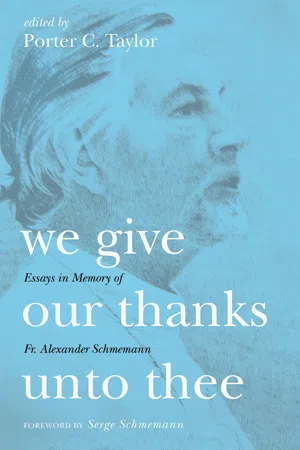![]()
Part 1
Schmemann in Context
![]()
Alexander Schmemann’s For the Life of the World
A Retrospective
William C. Mills
2013 is a watershed year, for it marks not only the thirtieth anniversary year of the falling asleep of Father Alexander Schmemann but also the fiftieth anniversary of one of the best selling books in Eastern Christendom. Written as a study guide for the 19th Ecumenical Student Conference on Christian World Mission in Athens, Ohio, For the Life of the World has been well received to say the least. It has been translated into over ten languages and is required reading at many seminaries and schools of theology. Even now, fifty years later, this little book, just over one hundred pages, continues to be read, studied, and discussed. This paper will provide the historical, religious, and cultural context of For the Life of the World through which to better understand this seminal work.
The Conference
In a two-page typed letter dated February 21, 1963, C. Alton Robertson, Director of the Commission of World Mission of the National Student Christian Federation, officially invited Father Alexander to be the main speaker at the 19th Quadrennial Ecumenical Student Conference in Athens, Ohio. The 19th Quadrennial was a continuation of a series of four-year conferences first sponsored by the Commission on World Mission, formerly known as the Student Volunteer Movement for Foreign Missions. The Commission on World Missions came under a larger umbrella organization called the National Student Christian Federation, with its headquarters in New York City, and was also the representative organization of the United States to the World Student Christian Federation. The National Student Christian Federation was started in 1959 as a larger organizational entity that included many denominational organizations, such as the inter-seminary movement, along with various other student Christian fellowship groups. It served as a wider network of domestic Christian college student and young adult groups across the United States and Canada. When the Commission on World Mission came under the auspices of the National Student Christian Federation, they were the new hosts of the quadrennial conferences.
Robertson’s letter emphasizes key themes which were to be highlighted in the conference such as the importance of Word and Sacrament as well as the overarching theme of the conference, “For the Life of the World,” focusing on the intersection of the Church and the world, theology and life: “Do not just talk about the Body of Christ as the Body of Christ gathered, but how the Church and the world interact, how they effect each other. Worship and work for the world.”
Seven days later, on February 28, 1963, in a brief handwritten note on seminary stationary, Father Alexander accepted Robertson’s generous invitation. It is then that he began writing his first and perhaps most important book of his lifetime, which even surprised him years later.
1963 proved to be an important year for Schmemann. In late 1962, after much searching, St. Vladimir’s Seminary moved from their original location at 121st and Broadway to 575 Scarsdale Road, a five-acre, tree-lined campus in Crestwood, NY. The seminary was dedicated on Saturday, October 2, 1962, and little over a month later, in late November, Schmemann was made the Dean of the seminary by Metropolitan Leonty (Turkevich), a position that Schmemann would serve until his death in 1983. Then, in March, Paul B. Anderson, a longtime friend of the Orthodox Church, contacted Schmemann, relaying a message from Metropolitan Nikodim (Rotov) of the Russian Orthodox Church. This was the first of many meetings that would eventually lead up to the granting of autocephaly to the Metropolia and the birth of the Orthodox Church in America (OCA). Schmemann contacted Metropolitan Leonty, asking for his advice and Archpastoral blessings, but since his health was failing, he simply told Schmemann, “Receive them with love.” And so Schmemann did. This would be the first of many conversations between the Russian Orthodox Church and the Metropolia.
The summer and fall of 1963 were also busy for Schmemann. Not only was he preparing for his upcoming fall classes and lectures at the seminary as well as working on the study guide for the conference, but he also attended the Fourth Faith and Order Meeting hosted by the World Council of Churches in Montreal. In mid-October, Schmemann spent two weeks in Rome, serving as an official Observer to the second session of the Vatican Council, where he, together with Greek Orthodox theologian Nicholas Nissiotis, offered comments and suggestions on key working documents of the council. The 19th Quadrennial conference ended a very important year for Schmemann.
One may ask, but why would a largely Protestant Christian organization invite an Eastern Orthodox priest to be the main speaker? Not only that, but the first Orthodox speaker. By 1963 Father Alexander had already been teaching at St. Vladimir’s Orthodox Theological Seminary for twelve years as an instructor of liturgical theology and church history, served as the dean of students, and worked as a chaplain. During this time, he was also an adjunct instructor of Russian Literature and History at Columbia University, New York University, and at Union Theological Seminary. Father Alexander was also active in talking to youth and young adults on college campuses. Prior to his arrival in the United States, Schmemann was very active in youth work, first in the Russian Student Christian Movement in France as well as one of the three Orthodox members of the Youth Department Committee of the World Council of Churches, which eventually led t...
